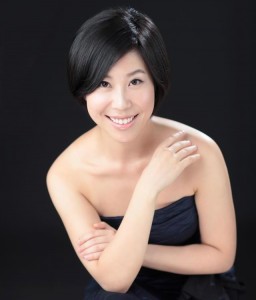Ear To Mind
presents
Pianist Jenny Q. Chai in Recital
Zankel Hall at Carnegie Hall, NYC
April 19th, 2012
Jenny Q. Chai walked out onstage for the first half of her Carnegie Hall debut in a red and black dress and performed for the first half of that first half a mix of Debussy‘s and György Ligeti‘s piano etudes (Debussy: #’s 3 & 6; Ligeti: #’s 2 & 1, Book I). Despite the huge generation gap between these two, the intertwined listing of Debussy and Ligeti had the two composers’ styles offsetting one another in such a way that an unassuming listener would have thought this was one cycle of pieces from the same composer.
The next three works were all premieres of sorts by living composers. The world premiere of Inhyun Kim’s Parallel Lines provided a burst of trebly energy that slows down to a low-end dirge, and then freezes for what turns out to be seemingly (I’m guessing) 5 pages worth of sustain (When the page turner changed pages 3 times during this sustain, I almost expected light laughter of the 4’33” variety from the audience) before resuming to a thrilling end.
Marco Stroppa’s Miniature Estrose (VI: Innige Cavatina), was given its first US performance, and it was a slow, dark, trilly work played sharply by Ms. Chai, whose bass-chord attacks were dagger-like in effect. The piece concluded with some inside-the-piano plucks.
The world premiere of Ashley Fu-Tsun Wang’s Current was another vibrant work that showcased a range of mood between inward restlessness and unabashed violence leading to more prolonged sustaining mixed with high-end plaintiveness.
Messiaen‘s Canteyodjaya rounded out the first half of the concert with more great complexity and intensity, and Chai even did her own page-turning this time.
Jenny Chai returned for Part Two, in a looser, light-green gown (The first time I’ve seen a classical performer change costume for the same concert) and played two brief works by György Kurtág–“Quiet Talk with the Devil” and “Les Adieux” from the studies series Játékok before concluding the program with the great piano cycle Kreisleriana by Schumann–Clearly, contemporary music DOES make Schumann sound young!
The audience didn’t let Ms. Chai leave without playing a couple of great encores. Up first was a piece by one of her teachers at Curtis, Nils Vigeland–The very arabesque-like “No. 3” from 5 Pieces for Jenny Q. Chai, and a complete surprise to my ears, John Cage’s The Wonderful Widow of 18 Springs, where she sang and played percussion on the piano lid (and under the keyboard). It was quite startling to hear this just two selections after Schumann, but I really enjoyed the fundamentally modernized language of this piece in the context of this entire program!
Jenny Q. Chai is certainly among the many great artists that display a great love for works from various periods of music and an ability to create a wise programming that shows a tremendous recognition for where composers share a likeness in their styles that are not always picked up by the naked ear. This concert was proof of that ability, and also a great showcase for her virtuosity.

